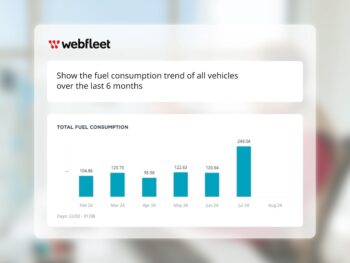Webfleet AI Assistant could prove gamechanger for fleets
Webfleet has introduced a new AI Assistant, helping fleet managers more efficiently interact with fleet data.

The tool leverages GenAI technology to allow fleets to interact with data by simply typing questions
Showcased at the IAA Transportation 2024 event in Hanover, the tool leverages GenAI technology to allow fleet managers to interact with data by simply typing questions.
Raghunath Banerjee, vice president of data solutions at Bridgestone Mobility Solutions, said the new AI assistant will be a game changer for fleet management.
“As fleet vehicles and assets are creating more and more connected data, our job is to provide actionable insights to fleet decision-makers in an easy and fast way. Our new AI Assistant is doing that with the simplicity of an intuitive AI – by directly interacting with their data and asking questions, fleet customers can take data-driven actions faster and with more clarity to improve their operations.”
Introduced as a beta project, the Webfleet AI Assistant will first focus on the Webfleet OptiDrive solution, providing tailored answers to driving behaviour challenges.
The AI tool delivers real-time and historical data about key fleet performance indicators, including fuel and energy consumption, and driving events such as idling, speeding and harsh braking.
Fleet managers can type prompts such as, ‘Give me the statistics for all driving time and total mileage for my drivers, aggregated for the last five months,’ or ‘What is the fuel consumption trend over the last three months?’ and get precise overviews in seconds. They can also access pre-defined prompts and suggested follow-up questions.
Webfleet says data security is assured; its fleet management software is ISO 27001-certified which means it fulfils the highest industry standard for data security, quality and availability. Data from the Webfleet AI Assistant on OptiDrive is kept within the Webfleet environment, protecting sensitive fleet information.
Latest Webfleet research shows almost half (48%) of UK fleet managers are either already using artificial intelligence (AI) in their fleet management or are planning to within the next five years.
More than half (58%) believe AI will help optimise route planning and logistics, while 51% anticipate it enhancing driver safety, behaviour analysis, predictive maintenance and asset management.
Meanwhile, 50% predict its emergence will reduce operational expenses and 47% expect it to automate administrative and compliance tasks.
Webfleet’s AI Assistant can be seen in person at the Bridgestone Fleet Care booth at IAA while selected customers can apply to test it out.
AI for fleetsIAA Transportation 2024WEBFLEET
















Colt Wright17. Sep, 2024
The world is changing very rapidly. The comprehensive realization of the potential of artificial intelligence will be the main force for the development and simplification of technological processes. And the use of IT is currently the main driver for accelerating global development. Technical innovations in artificial intelligence, IoT, AR, quantum computing, GreenTech and Deep Tech developments are now optimizing the digital model development system and helping to optimize workflows. This is the near future of most industries, including transportation and logistics. Today, the latest IT ideas allow for accurate calculations of delivery costs, create a wide range of different capabilities that simplify the planning of logistics processes, facilitate the autonomous performance of certain functions, and even provide an opportunity to anticipate certain types of risks. This applies both to the overall scaling of the company and to solving such issues as GLS-Integration von Shipstage https://shipstage.com/blog/verpackungsrichtlinien-bei-internationalen-sendungen Together, such technical innovations with digital business models provide an excellent foundation for development in 2024, which will be able to meet the growing expectations of customers.